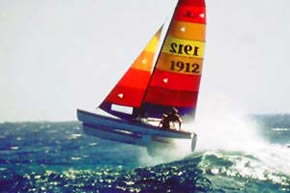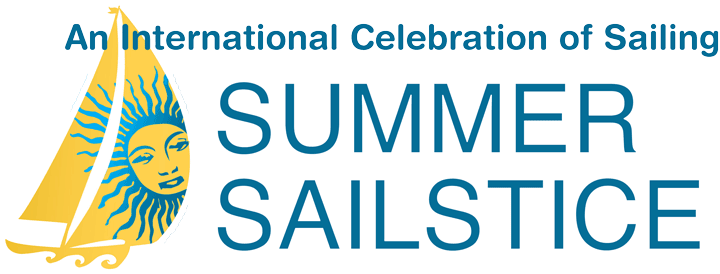
In the recent Scuttlebutt Sailing newsletter #4005, January 22, Geoffrey Emanuel wrote some excellent suggestions for changes needed in many junior sailing programs. However, I think the problem may be deeper and can’t completely be addressed within programs. Go to any junior sailing dock and it’s hard to see anything wrong. Enthusiastic instructors do a fabulous job teaching eager, wide-eyed kids many of the skills needed to sail. But programs can only make a contribution to a life-long love of sailing.
The new movie ‘Her’ has a man falling in love with the ‘program’ operating his device. The story is laughable because it seems so improbable for humans to fall in love with a program. Yet we often have people falling in love with sailing programs rather than sailing itself.
The shift may be may be more societal along the lines Nick Hayes pointed out in his valuable book, ‘Saving Sailing’. Camping, fishing, hunting and other, once popular, outdoor family activities, have faced similar declines.
Sailing programs are simply responding to market demand. Today’s two-income families have less time for family sailing and need to drop kids off at a ‘program’. Perceived competitive pressures inspire them to enroll in programs that produce winners. Naturally programs producing winners are in higher demand and a vicious cycle begins.
The word program is most often associated with computers which, with specific inputs, you’ll get specific outputs. Gone are the days when kids can simply ‘mess about in boats.’ There are goals, trophies and life-skills needing to be acquired to succeed in today’s competitive world. Sailing is not a way to relax, have fun and explore but another way to prepare to compete with the 7 billion people on the planet.
My lifelong love of sailing didn’t come from a program. I was fortunate to come from a sailing family and, as Nick Hayes again suggests, it was the multigenerational experiences of my early youth that got me hooked. However, it was a simple start. Our first boat was a used, white, styrofoam Snark and, when I was able to sail on my grandfather’s ‘big’ sailboat, it was a Rhodes 19. He let me take the tiller too!
Two of my brothers and a friend on the 'Snark'. Note the youngest brother is about two and has two lifejackets - the orange one and an inner tube.
Surveys of experienced sailors asking why they love sailing get answers like freedom, adventure and escape. Most of us experienced those feelings when we learned to sail. Can programs provide any sense of freedom and escape? It’s exceptionally difficult. Programs are in charge of someone else’s child and live in dread of the legal system. Waivers, chase boats, expected outcomes, parental pressures, rigid schedules give programs very little latitude to provide the kind of environment in which most of today’s older sailors developed a love of sailing. Maybe we need to ask for less from programs and more from parents the rest of the sailing community.
To move beyond what a program can teach you probably need to own your own boat (or 'unrestricted' access). Then, if the breeze is up and the air warm, you can carry on sailing well after sunset, after the program has packed up its chase boats and the instructors have gone home.
Most of my real adventures were in my own (or family) small boats. And it can be cheap too. Last year my brother bought an old Hobie 16 off a front lawn for $500(plus a free Sunfish too!). WD-40 got most of it working well enough for a late afternoon sail. Light air and casual chatter meant I wasn't ready for the quick puff causing the classic buried leeward bow instantly flipping us. Being a $500 boat the leeward hull was streaming bubbles and sinking fast. Luckily we waved to a passing lobster boat which came to our rescue, dragged us as close as he dared to a rocky beach where we swam and dragged the thing up high enough to drain from the stern plugs. Cold, wet, hungry and laughing we sailed a little more carefully on the way back and made it home at 7. It was just one more small adventure added to dozens of others over the years. Can you get that in a program?
It’s funny the rebellious, freedom loving, baby-boomer generation has created such a highly structured society, but we have. And, as Emanuel said, it’s happened in soccer, hockey and all youth sports. Can programs provide the freedom necessary? I’m not sure how. Could you imagine a program that let kids take out boats completely unsupervised after 5 o’clock and being fully responsible for putting it away with no one there to check on anything? I’d guess the thought would strike fear in the hearts of program directors.
Programs are doing a great job teaching many sailing skills but there may be a limit as to what we can ask them to do. Geoff’s suggestions will help, restoring some of the activities from his youth program days will help and maybe more new ideas will contribute. Adventure camps rather than racing clinics could provide a parallel track for different type of kid. But I suspect the real freedom and adventure that attracts so many sailors is out of reach of most programs and only available when you make the commitment to own a boat. When you join a program you’re asked to sign in but when I go sailing I’m looking to check out. Fortunately there are thousands of inexpensive boats out there and often, the less expensive they are the more adventurous they become!
A sailing friend recently saw a bumper sticker that read 'Safety Second.' It would be little scary if you saw that entering your shift in a coal mine or you're in charge of an OSHA inpected workplace or kids in a junior program but, if you think of your most hilarious and adventurous sailing stories, it's likely more accurate. The other quote that comes to mind, 'A ship in a harbor is safe but that's not what ships are built for.'
If we were sitting in a bar sharing a beer and a few sailing stories you wouldn’t hear many about things I did in a ‘safe and nurturing’ environment. I had those moments when very young but you’d quickly fall asleep. The stories that might keep you awake, cause some laughter, have some excitement are all outside of programs and outside the boundries of comfortable afternoon sailing. I love pleasant, relaxed, evening, sunset sails but they’re a small piece of the passion.
So, I’m not sure how it’s done, but to really get kids involved I think we somehow need to loosen the shackles of programs and parents. Safe and nurturing may be good up until about 10 or 11 but not long after horizons and adventure will beckon. Kids need to be able to explore their own boundaries and push the limits. Speed is just one element or excitement. Night sailing, distant shores, tricky passages test other limits. And how many kids in programs have ever experienced the quietness of sailing – without the ubiquitous sound of outboard engines (or bullhorns, horns, clocks and whistles) cluttering sailing’s peaceful beauty.
If you think about compelling stories think about Robin Lee Graham taking off on the 24’ ‘Dove’ at 16 years old, or recently Matt Rutherford singlehanded sailing, non-stop around the America’s on a used Albin Vega 27 or Laura Dekker singlehanding around the world at age14! Or read (or reread) Jack London’s sailing adventures of a century ago ‘sailing small boats.
‘
When your kids are 50 years old, sailing around with friends, hanging at the bar what stories will they be telling of their sailing youth? Where will all the cups, platters and ribbons of their youth be? Where are yours? My guess is the stories you’d tell of your sailing youth would not involve a ribbon won in a yacht club junior program but would involve something with more drama, more adventure and more fun than can be allowed in a waiver-restricted sailing program. Sailing programs do a great job with skills and have a great role to play to in building a foundation but I suspect it will be outside the boundaries of programs that the real, life-long love and adventure of sailing is developed.
Read:
Small-Boat Sailing
From the Human Drift Collection 1917
(Article 1st published in Yachting Monthly August 1912)
By Jack London

Is this safe? Maybe not. If it fun? You bet. One of life's many paradoxes is most parents want their kids to simply be happy and safe. However, being safe often just doesn't make people happy!? Uprorious laghter and the intense bonding that comes from memorable experiences often comes from edgier moments.
